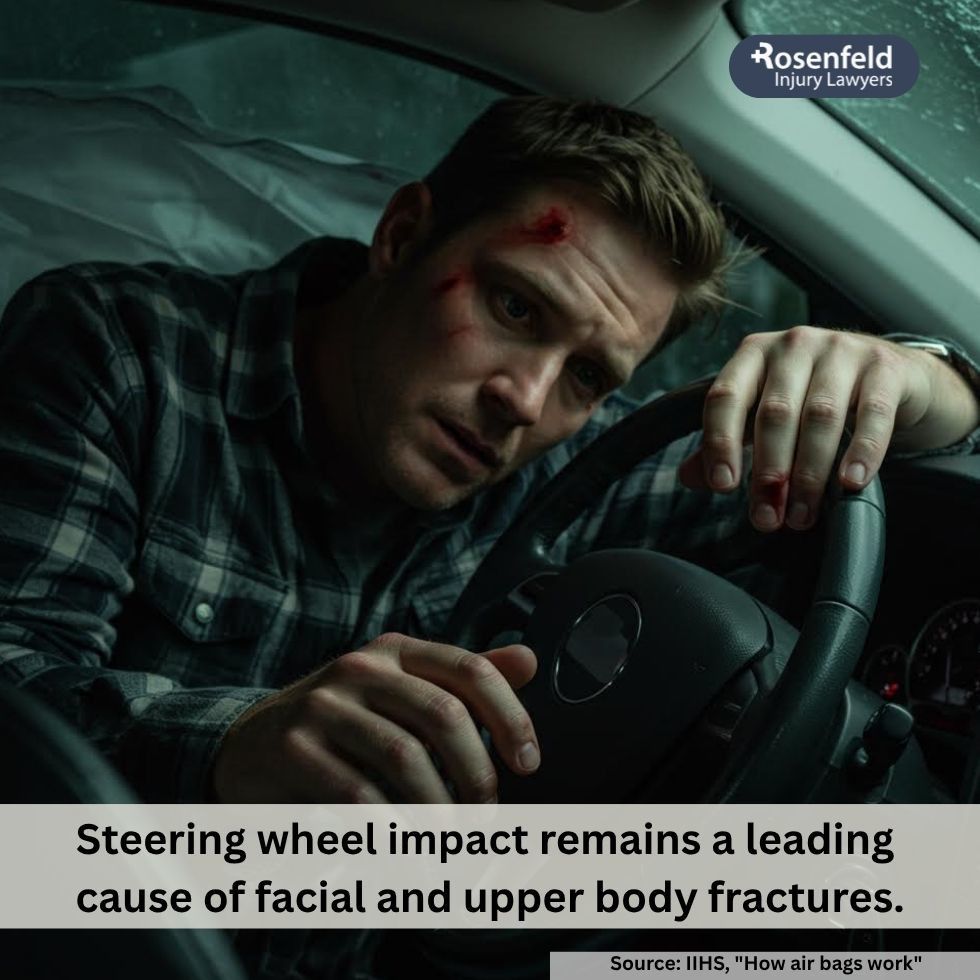- 24/7 Free Consultation: (888) 424-5757 Tap Here To Call Us
Steering Wheel Injuries in Chicago Car Accidents

Steering wheel injuries are some of the most common and serious injuries drivers suffer in a car accident. When a crash occurs, a driver’s upper body can be violently thrown forward, causing the chest, head, arms, or hands to strike the steering wheel with significant force.
In a city like Chicago, where unpredictable weather, aggressive traffic, and congested roads are part of daily life, the chances of being involved in a car accident are higher. Many steering wheel injuries occur in rear-end and front-end collisions, often at intersections or during sudden stops in heavy traffic.
At Rosenfeld Injury Lawyers, our Chicago car accident lawyer team helps victims recover what they need to heal and move forward.

Common Steering Wheel Injuries in Car Accidents
Injuries caused by the steering wheel can affect various parts of the body. The force of impact depends on several factors—how fast the car was moving, whether the driver was wearing a seat belt, and how close they were sitting to the wheel. Below are the most common steering wheel injuries suffered in a crash.
Head Injuries From Steering Wheel Trauma
When the head collides with the steering wheel, it can lead to facial injuries, concussions, or even skull fractures.
In more severe cases, drivers may suffer traumatic brain injuries (TBIs), which can result in confusion, memory problems, vision issues, or long-term cognitive difficulties. Facial trauma—including cuts, eye injuries, or broken noses—is also common when a driver’s head strikes the steering wheel.
Symptoms may be delayed, making immediate medical attention critical—even after a seemingly minor crash.
Broken Ribs and Chest Injuries After a Car Accident
Chest injuries are frequently reported after a car crash, especially in front-end collisions. The chest may hit the steering wheel directly, causing broken ribs, lung contusions, or, in some cases, a collapsed lung. Thoracic injuries like these can cause severe pain and difficulty breathing.
In some situations, broken ribs may puncture the lungs or heart, creating a life-threatening emergency. Even in less severe cases, chest injuries can take weeks or months to heal and may require pain medication, rest, and physical therapy.
Internal Bleeding and Organ Damage From Steering Wheel Impact
One of the most dangerous outcomes of blunt force trauma to the abdomen or chest is internal bleeding. These injuries may not be evident at the scene but can lead to rapid deterioration if not treated quickly. Common internal organ injuries include liver or spleen lacerations, stomach trauma, and kidney damage.
Symptoms might include stomach pain, fainting, or swelling—signs that are easy to dismiss without proper imaging, like a CT scan or ultrasound. Without diagnosis and medical treatment, these internal injuries can be fatal.
Hand and Wrist Injuries Caused by Bracing for Impact
Many hand and wrist injuries occur when drivers instinctively grip the wheel during a crash. The force transferred through the arms can lead to broken bones, torn ligaments, wrist dislocations, or soft tissue damage. These injuries may prevent someone from working, especially in jobs requiring manual labor, typing, or lifting.
Wrist injuries also carry a high risk of long-term stiffness, pain, or limited range of motion, which can reduce a person’s quality of life.
Why Steering Wheel Injuries Occur in Car Accidents
Steering wheel injuries happen for several reasons, often tied to the position of the driver and the nature of the crash.
One common cause is sitting too close to the wheel, which reduces the space available for airbags to deploy correctly and increases the chance of blunt force trauma.
Not wearing a seatbelt significantly raises the risk of being thrown forward into the steering wheel during a collision.
Improper airbag deployment—whether it’s delayed, too forceful, or fails entirely—can also result in severe chest, head, or facial injuries.
Many steering wheel injuries occur in front-end or rear-end collisions, where the driver’s body is violently jolted forward.
Poor posture or body position, such as leaning forward or driving with one hand, can expose vulnerable areas of the body to impact and increase the likelihood of severe injuries.
In each of these scenarios, the driver’s proximity to the vehicle’s steering wheel plays a significant role in the severity of the trauma sustained.
Long-Term Effects of Common Injuries Involving Steering Wheels
The aftermath of steering wheel injuries doesn’t end at the hospital. Severe injuries like nerve damage, broken bones, or traumatic brain injuries can lead to permanent limitations. Chronic pain, limited mobility, or anxiety about driving again can interfere with work, relationships, and overall well-being.
Some victims develop long-term psychological symptoms, such as post-traumatic stress or depression, especially if the injury causes disfigurement, job loss, or inability to return to normal activities.
Proper documentation, medical records, and consistent follow-up care are essential for physical recovery and a successful personal injury claim.
Medical Treatment and Diagnosis for Steering Wheel Injuries
A prompt and thorough medical evaluation is essential after a car accident involving steering wheel injuries. Emergency room doctors typically begin with a physical exam to check for visible trauma, tenderness, or signs of internal damage.
Depending on the nature of the injuries, imaging tests like X-rays are used to confirm broken ribs, fractures, or dislocations. CT scans and MRIs may follow if there’s concern about internal organ injuries, brain trauma, or spinal damage, especially when symptoms like chest pain, confusion, or shortness of breath are present.
Once diagnosed, treatment may include pain management, immobilization, physical therapy, or even surgical intervention for severe injuries. Car accident victims must follow all medical advice, attend follow-up appointments for recovery, and support their personal injury claims.
The insurance company can use gaps in care or missed appointments to question the seriousness of the injury. Complete and consistent documentation helps build a stronger case and protects your right to full compensation.

Compensation Available for Steering Wheel Injuries in Chicago
In Illinois, car accident victims can file a personal injury claim to recover compensation for both economic damages and non-economic damages, including:
- Medical expenses (past and future);
- Lost wages and reduced earning potential;
- Property damage;
- Pain and suffering;
- Disability or disfigurement;
- Emotional distress.
A car accident lawyer can calculate your current and future losses, ensure proper documentation is included, and negotiate with the insurance company for a fair settlement.
When a Manufacturer May Be Liable
There are rare but severe cases where a vehicle manufacturer or parts supplier may be held legally responsible. If the airbag fails to deploy when it should have, deploys too late, or inflates with excessive force, the result can be severe injury or even death.
Similarly, if the steering column is poorly designed, improperly placed, or fails to absorb crash impact as intended, it may increase the severity of injuries to the chest, face, or internal organs.
If your injuries were made worse by a malfunctioning airbag system or flawed steering wheel structure, a Chicago product liability attorney can help investigate whether a claim should also be filed against the automaker or component manufacturer.
Consult a Car Accident Lawyer in Chicago!

If you suffered steering wheel injuries in a car accident, you don’t have to face the aftermath alone. At Rosenfeld Injury Lawyers, we have years of experience helping car accident victims in Chicago recover the compensation they need to move forward.
Our Chicago personal injury lawyer team will investigate the accident, collect medical records, calculate your medical bills and lost wages, and negotiate with the insurance company on your behalf. We’ll take your case to trial if needed to fight for the recovery you deserve.
Call us at (888) 424–5757 or complete our contact form to schedule your free consultation.
All content undergoes thorough legal review by experienced attorneys, including Jonathan Rosenfeld. With 25 years of experience in personal injury law and over 100 years of combined legal expertise within our team, we ensure that every article is legally accurate, compliant, and reflects current legal standards.







